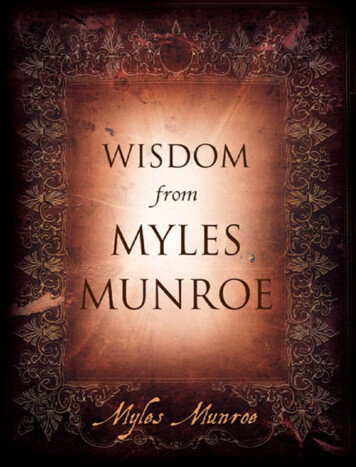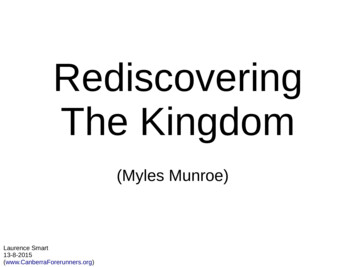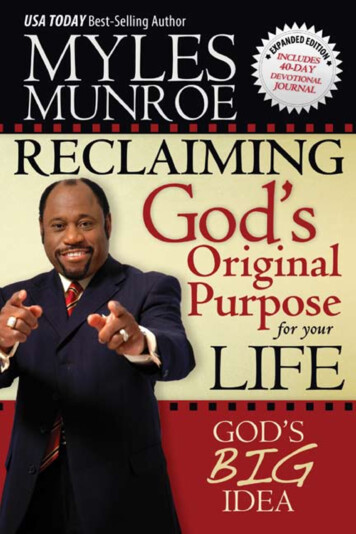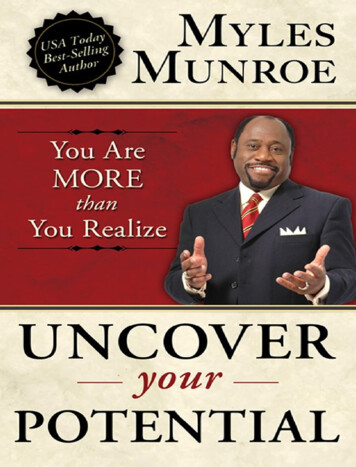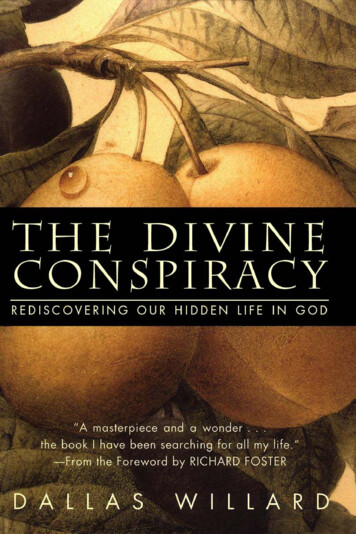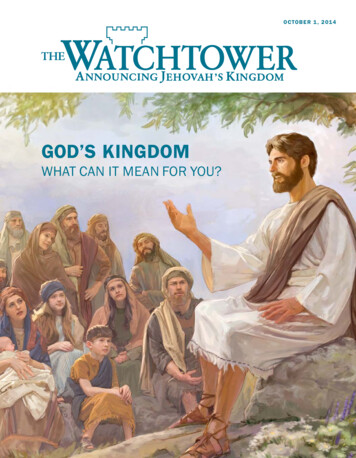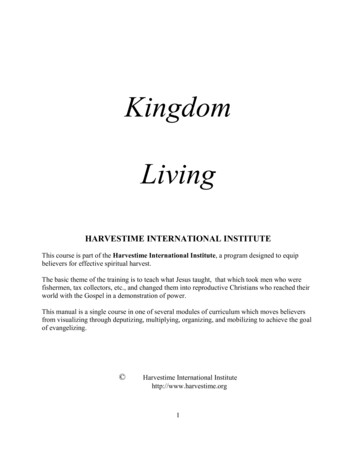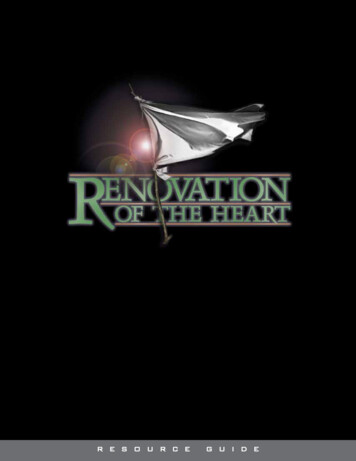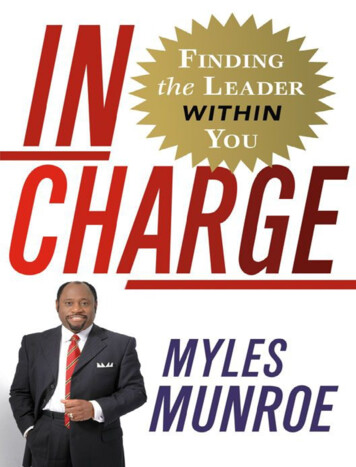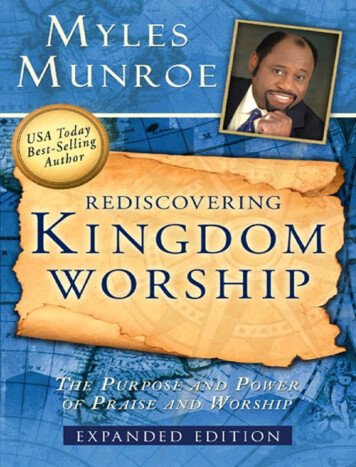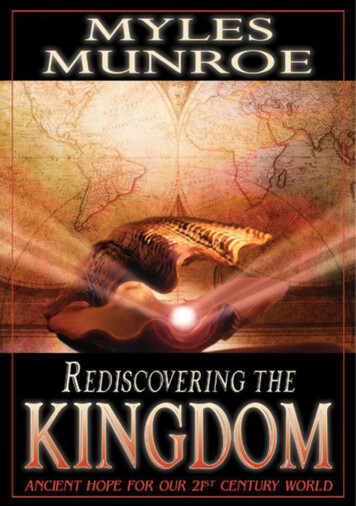
Transcription
This is text to throw off the web. I hope this workswe will find out. I will put the text in white and haveit hidden from human eyes. But the web will readthis. And hopefully it won't recognize this ebook.REDISCOVERINGTHEKINGDOMMYLESMUNROEThis is text to throw off the web. I hope this workswe will find out. I will put the text in white and haveit hidden from human eyes. But the web will readthis. And hopefully it won't recognize this ebook.
DEDICATIONTo the millions of religious people around the worldworking tirelessly to fulfill the hunger that still exists afterall the rituals, customs, traditions, formalities, and work—may this book bring comfort to your mourning soul.To the late Alma Trottman—your life and legacy live on inour memories and thoughts of you. You truly lived aKingdom-filled life and I know your time with the Kingnow is like Esther. Perhaps you are both together enjoyingroyalty at its best.To the youth of our world—may your generation neverhave to struggle through religion to find the joy of theKingdom.To the King eternal, immortal, the all wise God, and myLord, Jesus Christ—may Your Kingdom and Your will bedone on earth just as it is in heaven.
TABLE OF CONTENTSDEDICATIONACKNOWLEDGMENTSPREFACEPROLOGUE: Hidden TreasureINTRODUCTION1: Discovering the Origin and Purpose of Man2: Rediscovering the Kingdom Concept3: Enter the King and the Kingdom4: The Assignment of Jesus: Restore the Kingdom5: The Good News of the Kingdom6: A Kingdom of Servant Kings7: Kings, Prophets, and the Kingdom8: The Priority of the Kingdom9: Understanding the Kingdom Concepts
ACKNOWLEDGMENTSThis book has taken more than 20 years to prepare andthree years to write, and many people encouraged meduring the entire process. There were times when itseemed like I would never get through it. However, withpersistence and a keen focus, it is finally complete. I wantto acknowledge everyone who participated for their helpand support, without which this project would never havebeen finished.Nothing in life is ever successful without the corporateeffort of many gifted people who were willing to networkand submit their talent, experience, and passion for acommon goal. I am always reminded that we are the sumtotal of all the people we have known, met, and learnedfrom. This work is the product of countless individualswhose thoughts, ideas, perspectives, and work have givenme the exposure to the knowledge I have placed in thisbook.I wish to thank my wife, Ruth, and our children, Charisaand Chairo (Myles Jr.), for their patience andunderstanding during my endless travels and late-nightwriting. My achievements are yours, also.To Don Milam, my excellent editorial advisor and guide indeveloping this manuscript—you are an author’s dreamand a gift to many who will read this work. Thank you forpursuing me to get this done.To all the members and staff of our ministry in Nassau,Bahamas, and around the world—thank you for allowing
me to develop and refine these ideas and concepts bysharing and testing them with you. May His Kingdomcome through you!
PREFACEThe greatest threat to the future of the world is religion.Nuclear weapons, terrorism, SARS, shifting governments,military coups, and AIDS are simply tools used byreligion. More wars have been fought in the name ofreligion than any other influence. Millions have died overthe past 2,000 years under the destructive hand ofreligious zeal. Misplaced and misguided religious passionhas produced such historical scars as the Crusades, theInquisition, ethnic cleansing, and the horror of theHolocaust.Why is religion so powerful and controlling? Why is itmore powerful than politics, military arms, and scientificadvancement? Because religion is not just a social,cultural, political, or ideological factor; instead it finds itspower in the personal chambers of the soul of theindividual. Within the soul we discover the source of theprivate motivation that forms perceptions and behavior.Man is more willing to die for the sake of his religion thanfor any political, social, or ideological reason.Religion is as old as mankind, finding its roots in theprivate recesses of the human spirit. Every culture, nomatter how old or far removed, has developed some formof religious practice that attempts to satisfy an elusivevacuum in the pit of the human soul crying out forreason, purpose, and significance. For mankind, life onplanet earth has been nothing more than a long tediousmarch down the road of time, with each new generationsearching for something they cannot define. The longchains of civilizations have left undeniable imprints onthe pages of history—evidences for our generation that
the search continues. From the secrets etched on the wallsof ancient caves to the grand archaeological monumentsto the remnants of the great empires, man marches onseeking to find himself and make sense of his world.Man’s travels through this world have produced atapestry of religious practices and ideologies that onlyserve to create more problems than they solve.A brief look at our modern, sophisticated, technocratic,cyberspaceage world of today can be the source of fear,depression, discouragement, insecurity, and uncertainty.From the archaic world of the cave men and bush huntersthrough the progressive succession of agrarian cultures,to the advent of the industrial revolution leading to thescientific age of post-modernism and the computer age,we are still no better than nor different from ourancestors of old.The only difference seems to be the sophistication of ourtools and weapons. We are smarter but not wiser; we livelonger but not healthier; we have more but enjoy less; wecan go to the moon, but we cannot go home to a goodfamily; we have access to more information but know lessabout life. Tragically, we protect whales, but kill ourchildren; we improve the quality of our food but produceless healthy strains for our consumption; we have morereligion but less love; and we blame others for our choicesas we look to ourselves for solutions to the problems wecreate.The 21st century seems to be more uncertain than all theprevious centuries in history. Planet earth is spinningthrough the solar system like a spaceship without acompass as it travels on a course to self-destruction. Onthis long march of humanity, mankind has invented and
developed a variety of systems and social structures in itsattempt to grapple with the realities of life on our globalspaceship. Over the centuries we have watched thecreation of a variety of governmental systems includingdemigods, dictatorships, monarchies, and tyrannies, aswell as the theories and practices of socialism, democracy,communism, and imperialism. Each of them has had anopportunity to try to make life better and more “humane”on our great planet. However, wars have increased ratherthan decreased, weapons of mass destruction are moreavailable than ever before, and fear for safety andsecurity is greater than ever before in history. Allgovernments—even the best form we have developed,democracy—have failed to realize the world we keepsearching for.Two of the greatest tragedies of our modern history wereWorld War I and World War II, when millions lost theirlives at the hands of their fellow planet-dwellers. AfterWorld War I, various leaders joined together and made apromise that it would never happen again. They createdthe League of Nations, an organization dedicated topromoting world peace and initiating reasonablesolutions to human conflicts. However, this pipe dreamended in the explosion of World War II.After that conflict ended, world leaders made a secondcommitment, determining once again to never allowmankind to spiral down into the death-dealing clutches ofinternational war. This commitment gave birth to theUnited Nations, a world body dedicated to making andkeeping the peace around the world. Yet, more wars havebeen fought since the formation of the United Nationsthan before its creation. Today, as wars continue to ravageour planet, the United Nations itself, along with its
purpose and usefulness, is under serious scrutiny.I find it ironic that most of the current wars and tensionsare products of, or strongly influenced by, religions.Where do we go from here? What do we do? What is theanswer? Why can’t we just live together? Why is mankindso frustrated? Why do our cultures keep clashing intoeach other and why are our children on the streets killingone another?These are the questions that this book is attempting toanswer. The solution to our dilemma is somewhere in themiddle of our search. It makes sense to conclude that ifour world has no answers to the questions it asks and nosolutions to the problems it creates, then it might be wiseto look to another world for help. Rediscovering theKingdom answers this very proposition. I am not talkingabout some weird, impractical, illusive, metaphysicalnotion of a pie in the sky, but rather a reasonable,tangible, human-friendly solution that responds not onlyto our unspoken desires about life here on earth butbeyond.This book is about you and your passion to understandlife. It is about your search for control over yourcircumstances and destiny. It is about living life to itsfullest and about reconnecting to your true self. You werecreated not just to exist but to live a fulfilled andsignificant life. This book is about that life—your life! Joinme as we seek to discover an alternative reality at the endof man’s long search for truth.
PROLOGUEHIDDEN TREASUREThe old lady was dressed in what seemed like sevendresses. Her fingers were exposed despite the fact thatshe wore a pair of life-worn gloves. She pushed an oldshopping cart that testified that it was her mobile home,and she lived at the mercy of the elements. Her faceshowed the wear and tear of years of living. She was bentover, looking in a garbage can, searching for lifesustaining remains discarded by the more fortunate ofsociety.Suddenly, she shot up out of the barrel and shouted, “Ifound it. I found it!” There between her thumb and indexfinger she held the most beautiful pearl.I ran over to her and asked if I could help her. She smiledand shook her head with a confidence I did not expectfrom one in her status of life. Then she proceeded to tellme the story of her life that still impacts me today.She told of how she was born into a wealthy family andthat her grandfather had left a treasure for her before shewas born. During her infant years a fire had destroyedher family home, which was once on the site where thebarrel of garbage now stood. The result was that herfamily lost everything, including the chest that held thetreasure from her grandfather. She came to that spotevery day to search for that treasure. Many people whoknew her story would give her handouts to wear andleftovers to eat. But she said she believed that if she ever
found that one treasure, then she would have all of herneeds met and be able to repurchase the property lost byher family and rebuild the family house that wasdestroyed.Today was her lucky day—she found the treasure. Formany years she had only heard about it and haddescriptions of it, but now she actually had it. Her life waschanged that day, and her search was over. She regainedher status and position in life and gave up all her life’sstruggles for the sake of that one treasure.It was a pearl. May you find your own pearl in thesepages.MATTHEW 13:44-47The kingdom of heaven is like treasure hidden in afield. When a man found it, he hid it again, and then inhis joy went and sold all he had and bought that field.Again, the kingdom of heaven is like a merchantlooking for fine pearls. When he found one of greatvalue, he went away and sold everything he had andbought it.
“An idea is more powerfulthan an army.”
INTRODUCTIONThere is nothing more powerful than an idea. Ideascreated and now control the world we live in. When anidea is conceived it is called a thought; when a thought isconceived it is called a concept. Concepts are the materialthat dreams are made of and they serve as the substancefor living and interpreting life. Everything humans havemade or invented was first preceded by an idea. As amatter of fact, inventions are often called one’s “brainchild.” In essence, the mind can be impregnated by ideasthat develop into concepts that become visions thatproduce reality.Concepts are to life what the blood is to the body. Perhapsthis is what the great king Solomon meant when he wroteover 3,000 years ago, “As a man thinks so is he.” You areand become your concepts. Psychologists describe ourvalue and estimation of our life by the nature of our “selfconcept.”Concepts rise in value as we consider our perception andinterpretation of life. Human communication is solelydependent on concepts. We can only understand life tothe degree that our concepts are correct. As a matter offact, the purpose and goal of communication is to transferyour ideas and concepts from your mind to another mind.Therefore, communication is only successful when thesender’s concepts are received accurately and properlyunderstood by the receiver and vice versa.If your ideas are wrong then your concepts are wrong,and consequently, your understanding will be inaccurateand incomplete. You can only understand properly if your
concepts are in alignment with your ideas and your ideasmust be based upon God’s dynamic truth. The originalconcept is always in the mind of the sender. In this state ofthe thinking process it is called a “precept.” Simply put, aprecept is “an original idea.” Therefore, in order tounderstand the original concept, you must have a cleargrasp of the precepts of the sender of a message. Theheart of understanding is precepts and concepts. Error isa product and a result of what is called “mis-conception.”In reality, the receiver misunderstood the concept of thesender.This book will fail in its purpose and intent if I do notsuccessfully convey and transfer my precepts, concepts,ideas, and thoughts to you the reader. So let’s proceed inexploring the critical concepts that lead to the answer toman’s search for meaning.THE LONG SEARCH FOR THE IDEALIn every generation, since the beginning of time, thedream of a utopian society has motivated and sustainedthe passion of mankind, producing highly developedcultures and social systems as they moved forward in thispursuit. The driving force and desire for the perfect worldfinds its way into every civilization and has been thesource of inspiration that has led to the invention ofphilosophical ideas, social infrastructures, and evenreligions, all having some kind of impact on ourcontemporary communities. This force is centralized inman’s search for the ideal.Passion for the ideal produced in many ancient culturesthe dream of a messianic vision. This is the belief that
somewhere in some distant future from some unknownplace a person would come who would provide theanswers to all our problems. He would establish the “idealworld” free from pain, hatred, fear, poverty, and othersocial ills—a world of peace, love, joy, and harmonyamong all mankind.This search and desire for an idyllic world is the source ofthe development of the concept called “ideology.”Ideology is the most powerful energy that has impactedthe lives of people over thousands of years and continuesits effects to this very day. An ideology is the formulationof ideas and thoughts that have been pondered,developed, refined, defined, and formalized. These ideasare also defined as a philosophy, or “a way of thinking.”Some of these “formalized ideas” have produced “schoolsof thought,” which became the foundations of theoreticaland ideological premises for the creation of systems ofgoverning communities, societies, cities, nations, and theworld. On the negative side, some of these ideologies havebeen the source of injustice, destruction, oppression, masspoverty, depression, and social terror.These ideologies have carried a variety of labels, and overthousands of years they have emerged, submerged, andthen reemerged in succeeding generations. Some of theselabels are quite familiar even in our generation:imperialism, socialism, communism, dictatorship,humanism, deism, democracy, monarchy, and communalliving. Many of these have been tried, revised, integrated,revived, and have been the source of many socialexperiments.Yet, no matter how much man has tried to re-create hisworld, the fulfillment of his hope and desire for “utopia”
still eludes him. Our most recent attempts have led to theadvent of the ideology of “individual freedom” and theadmirable concept of “self-determination” and “a justsociety,” which we have termed in our moderncivilization as “the democratic ideal.” Despite the fact thatthis is the most civil form of national governance andsocial relations within a society, even this has notmanifested the utopia its founders dreamed of.The motivation and inspiration for the pursuit of the civilsociety and the democratic ideal is the concept of“freedom.” The pursuit of personal freedom is thestrongest motivator in Western social consciousness. Thisdesire to be free to pursue one’s personal dreams and tomaximize one’s potential is the foundation of thedemocratic ideal and is embraced as the ultimatestandard of a free society. However, the societies andcommunities that have tried this noble “freedom”experiment are still plagued with the inconsistencies ofinequality, racism, prejudice, injustice, corruption,jealousy, suspicion, competition, abuse, neglect, and aclear disparity between the “haves” and “have-nots.” Inthe end, mankind has become imprisoned by his pursuitof freedom.THE SOURCE OF THE DESIREI have had the privilege of traveling to 70 nations andhave worked with every race, culture, socio-economicclass, and religious and political group, and yet I am stillamazed that in each one of these societies the search isthe same. In fact, it is my conclusion that we are all thesame and searching for the same thing. What makes usdifferent is the route and systems we implement anddevelop to find what we are searching for. Simply put, all
people are the same and looking for the same answers tothe same questions.A few years ago I received a gift from some friends in afaraway country with whom I had the opportunity towork. Their culture and social background was differentfrom my own. They had heard me speak on the subject ofman’s search for meaning and purpose in life. The giftthey gave me was a beautiful hardbound book with a titlethat still sticks in my mind 20 years later. The book wascalled The Long Search. I was intrigued with this simpletitle but, even more than that, I was pleasantly surprisedby the content of the book. It has become one of myfavorite books in my personal library.The book chronicled the history of the invention,development, refinement, and practices of all religions inthe world. The photos captured my imagination, the textexpanded my appreciation of the complex nature ofreligions, and the research provided insight into thecommonality of the human family. At the heart of thebook was the concept that all religions are a result ofman’s search for a Supreme Being—identified as “God,”“divinity,” or whatever other word one chooses to fill inthe blank. Religion is man’s attempt to respond to hisdesire to find some type of meaningful, and possiblyintimate, relationship with a Supreme Being as he seeks tofind some reasonable meaning to life.This human search for Ultimate Reality is natural andcommon to all human cultures—even the self-acclaimedatheist inherently believes that, at the very least, there issomeone or something out there not to believe in. Even inthe most primitive societies we find this expression ofdesire to seek, find, and understand a Supreme Being as
evidenced in the creation, development, and practice ofsome form of religion.However, the question confronts us: from where did thisnatural desire and need to seek for a higher poweroriginate? This internal soul-searching irritation—thatthere must be a reason and design for the universe andcreation—must have a source. The “long search” forreality obviously implies that something is lost. It isimpossible to search for nothing. Therefore it is mycontention that the very nature of man’s soul searchindicates that something he previously possessed ismissing.It also seems that this need to search is not a choice but anecessity. The search is personal as well as corporate.Perhaps the best way to find what is missing and what weare searching for is to identify what you need or desire.For example, thirst implies the need for water, hungerimplies the need for food, and tiredness implies the needfor rest.So, we can identify what we lack by what we naturallydesire and thus recognize our need. We will discuss thisneed of mankind in succeeding chapters. However it isimportant to at least acknowledge its existence andoverpowering control over all mankind and to alsoappreciate that this deep need controls and dictates man’sbehavior, both individually and corporately.IDENTIFYING THE NEEDI have spent over 40 years studying and researching thisphenomenon, first in a personal pursuit and then also in alifelong commitment to help others find some answers to
their dilemma. I have come to the conclusion that thecommon pursuit of all humans is the pursuit of power, thedesire to possess the ability to control one’s circumstancesand destiny. I know this may shock you and perhapscause you to go into denial. Most of us would not want toadmit that we desire something as frightening as power,but the reality is that this is the basic desire in everyhuman heart.When I use the term power, I am not referring to thetyrannical, oppressive, dictatorial control of people, butrather the ability to control one’s own circumstances andenvironment. It is this lack of control over our daily lives,situations, and circumstances that makes us feel sohelpless and live as victims of life. For most of us life issimply a daily struggle as we try to stay afloat in a sea ofuncertainty and pressures of all sorts. At the same timewe wrestle with a sense of dignified slavery to theinstitutions of our societies.Our desire and passion to gain this power to control ourcircumstances and environment is the motivation for ourbehavior. We strive to gain positions of influence in orderto accumulate financial wealth. We seek the power thatmoney promises us: political and spiritual power, theaccumulation of status symbols, superior knowledge, andmany other forms of controlling dispositions. I believethis pursuit for power is simply the pursuit of dominionover life.This human preoccupation and desire for power anddominion is also the fuel for man’s obsession withprogressive development in all disciplines includingpolitical science, social science, biological science,technical science, spiritual research, economic research,
and all other aspects of the human experience. The resultof this power search is found in the long human marchtoward modernization. Over the past 6,000 years mankindhas tried and continues to try to control and tame theenvironment through the inventions of primitive andmodern instruments. For example, in science he tries tostop the aging process, improve the quality and length oflife, and produce every type of pill to solve a myriad ofproblems. Ultimately his greatest challenge is to preventthe reality of death.Yet no matter how far man thinks he has progressed, theability to achieve dominion and power over life and deathon earth still eludes him. In fact, in light of all theuncontrollable social ills, health epidemics, militaryconflicts, political unrest, economic uncertainties,religious clashes, and destruction of the environment, itseems as if man’s advancement is an evolution, backwardin time.This human failure to achieve control and mastery overhis environment and circumstances has left him with adeep desire for a brand new world. The human spiritlongs for a world he can control where circumstances areat the mercy of his will. This is the greatest human desire.This is also the source and motivation of religious andspiritual development and practice. In every religion wediscover the component that promises power to controlcircumstances and even death itself. This explains whythe deep dark secret practices of witchcraft and spiritismare so attractive to millions; they promise power overpeople and circumstances.The human spirit is possessed by this desire to dominate,rule, and control the personal private world and the
environment. Man is in search of the ultimate governingpower of dominion. The desire for power is inherent inthe human spirit. To understand this desire for power, itis necessary to understand the original purpose anddesign of mankind and the assignment for which he wascreated.
“There is no greater pursuit ofman than the pursuit for powerto control our circumstances.”
CHAPTER ONEDISCOVERING THEORIGIN AND PURPOSE OF MANIt was five o’clock in the morning and I had not slept allnight. I was nervous and anxious. It was the big day—time for the test I dreaded. It was a memorable dayduring my years at the university. I had studied all nightand faithfully read all my notes, books, and reviews. Itwas my final biology test. The focus of this class was thehuman anatomy.At the end of the test I felt confident that I had done well.Three days later I was proven right when my professorcalled me in to congratulate me for receiving the topgrade in the class. I was so proud of myself and felt I hadachieved something outstanding. As I stood there lookingat the papers he handed to me, I suddenly realizedsomething I had never thought of. Throughout this courseof study I had become well educated in the knowledge ofthe human body—the names, purposes, and functions allof its intricate parts and organs. The thought that struckme was that I knew what the human body was but did notknow why the human was. In other words, I knew theproduct but did not know its purpose.This youthful discovery still motivates me today. Thereare over 6 billion people on planet earth and only a few ofthem know why they exist. What a tragedy! Who is man?Why was man created? Why was he put on this planet?What is he to do? Where did he come from? What can hedo? Where is he going? These questions strike at the heartof all human pursuit. All that men want to know are the
answers to these questions.Are humans simply a link in some evolutionary chain, asproclaimed by the theologians of evolution? Are wesimply sophisticated primates participating in the dramaof the survival of the fittest? Are we simply a freakaccident of some cosmic big-bang mishap from which weemerged from the slime of some cosmic soup as themagnificent reasoning self-conscious being to which wehave evolved today? I find it impossible to believe thatanyone could believe such a theory. This unreasonable,unsubstantiated, unproven theoretical proposition has nofoundation in truth and desecrates the truth of man’sorigin. It dilutes and diminishes his glorious purpose.Man is the crowning act of an intentional Creator. Heexists as God’s co-regent in a world created for him. Inexamining mankind we will discover the beauty and themystery of God’s purpose for the whole of creation.It seems that the end of all things will be discovered in thebeginning of all things. Therefore, we will begin our studyby considering God’s original plan for His creation. Quiteobviously, if we seek to understand the creation, we mustfirst understand the Creator, because the original purposeof any product is only in the mind of the creator of thatproduct. Therefore, to discover the purpose and reasonfor mankind’s creation and existence, we must attempt totap into the mind of his Creator. After all no one knowsthe product like the manufacturer.THE ORIGIN OF THE FIRST KINGDOM
First, it is essential to understand that before anythingwas, God is. The word God denotes “self-existing one orself-sufficient one” and describes a being that needednothing or no one to exist. Therefore “God” is not a namebut rather a description of a character. Because of whoand what He is, He alone qualifies for the title of God. Thistotally independent God existed before all things andbegan His creative process by first producing the entireinvisible world, which we also have come to know as the“supera” or “above” natural world. This act of creationinitiated the concept of “ruler” and “ruler-ship” as theCreator became the governor over a created realm.Another word for ruler is “king.” God called this invisiblerealm or domain “heaven” and thus He became the Kingover the domain, heaven.This was the beginning and creation of the first kingdomcalled “the invisible Kingdom of God.” This was also theintroduction of the concept of “kingdom.” This concept of“kingdom” is critical, essential, necessary, required, andimperative in order to understand, appreciate, andcomprehend the purpose, intent, goal, and objectives ofGod and mankind’s relationship to Him and the creation.DIVINE MOTIVATION FOR CREATIONIt is not unreasonable to ask why God, the King of heaven,would want to create sons in His image and a visibleuniverse. Was He not satisfied and pleased with aninvisible realm of angels and powers to rule? I believe theanswer to these questions lies in understanding the verynature of God Himself. There is much about this greatawesome, self-sustaining One that we do not, cannot, andmay never know, but He has revealed enough of Himself
to mankind to allow us to glimpse some of themagnificence of His nature and character.One such characteristic is that “God is love” (1 John4:8,16). Please note that He does not say that He “has” lovebut that He “is” love. This is an important distinctionwhen it comes to understanding His motivation, becauseif God is love, then His actions would naturally orsupernaturally be th
REDISCOVERING THE KINGDOM M Y L E S M U N R O E This is text to throw off the web. I hope this works we will find out. I will put the text in white and have . (Myles Jr.), for their patience and understanding during my endless travels
